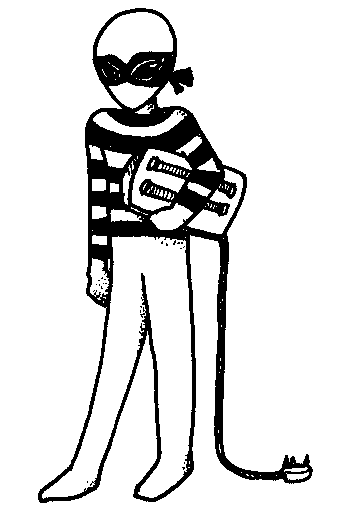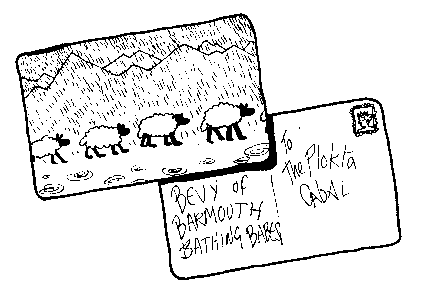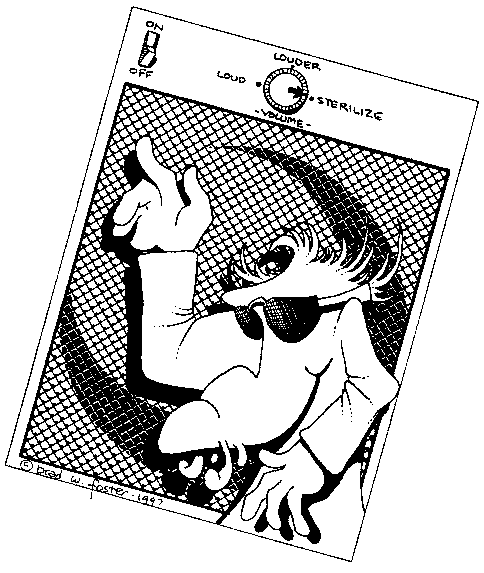
"Well, Officer, he was completely bald and..."
Tripping into our e-mail box came the following tale of holiday excess, from Dave Langford. This brought back many happy Plokta memories of trips to the colder and damper bits of Wales. We were all younger and thinner then, and we have the photos to prove it.
Yes, Dr Plokta is right and superfluous technology has changed my life. We'd been trying for years to sell our tiny flat in North Wales, because Hazel can't cope with long car journeys and has thrown up in every possible emergency stopping place between Reading and Harlech. Then some idle web research at www.railtrack.co.uk indicated that, glory glory, there were rail connections that didn't go via the North Welsh coast and that famously unreliable link through the Ffestiniog Railway (motto: "Wait for a connection when the pubs are open? You must be joking, bach.").
So we planned an experimental voyage of rediscovery, hindered only slightly by the coarse laughter of the chap at Reading station when I proudly displayed a journey plan printed from the web site. Reading, Swindon, Newport, Shrewsbury, Dyfi Junction, Harlech: "That's not a valid route," he chortled. "You don't want to believe that web rubbish," he continued. "I can't sell you a ticket for those connections," he bragged. Having reduced us to mere puddles on the floor, he casually added that if we didn't mind going via Birmingham and changing trains only twice, he might condescend to allow our holiday after all.
Tuesday 14 October
The hardest part is getting up, and submitting oneself to Railtrack's cold equation: arrive Harlech 14:06 = depart Reading 07:38. After this initial horror the journey was blissfully uneventful, never more so than at Machynlleth, where all doubts about missing the connection are eliminated by having the next train (a mighty juggernaut of the Cambrian Coast Line, with the maximum quota of two carriages) already visibly panting with impatience in a siding when you arrive.
At Harlech itself we were welcomed by rain, rain, rain, and sheep intermittently visible through more rain... but we'd arrived without Hazel's stomach trying even once to escape the cruel confines of its destiny, and the world was changed. The possibility of continued Snowdonian excursions glowed once again before us! Slightly obscured, of course, by the rain.
Complications: the flat's lease demands a certain amount of maintenance work, and with an eye to saleability we'd recently had the outside walls repainted and all the windows replaced. The name of the builder was thus associated with several rude words when we noticed that Hazel's favourite kitchen bins and storage jars had become receptacles for soiled paintbrushes; that various useful items like cutlery and bedding were no longer to be found; and that, on this day of rain, chill, damp sogginess, shivers and still more rain, the sole electric fire had been abducted by Alien Greys.

"Well, Officer, he was completely bald and..."
Later, we worked out that the loathsome estate agents had loaned keys to potential buyers and probable pilferers and let them rummage unescorted, making it difficult to pin down the guilty person. The immediate need was heating: and so we began the cruel climb from our coastal-plain slums to the posh bits of village around Harlech Castle on its high outcrop, where I remembered a hardware shop. At this stage the weather, hitherto characterised by rain, took a dramatic turn in the direction of very heavy rain.
Connoisseurs of dramatic irony will already have deduced that the hardware shop had become a Red Cross charity outlet with no electric fires at all. Oh, how we laughed at one another as we slithered and gurgled back down that long, steep hill which was now doing a creditable waterfall impersonation. Did I mention the rain?
Wednesday 15 October
Another majestic train journey, pootling northward around the coast to the big-city hustle of Porthmadog, where one can buy decadent delights like sheets, electric fan-heaters, more food than may be conveniently carried, and lunch in our favourite back-street pub Y Llong (The Ship). Not many remote Welsh pubs offer a lunchtime choice including, besides the usual obscure parts of ploughmen, Thai curries or dim sum. Another rule of Welsh or indeed world holidays is that every bar, if carefully examined, will contain someone who knows Martin Hoare. This time -- besides the landlord, who hardly counts -- it was us.
 Tradition decreed that at this stage we should buy and send numerous postcards depicting soggy flocks of sheep, variously captioned. For SFX, "Wild enthusiasm at mass rally of Simo's fan club"; for Maureen Speller, "Incipient BSFA members eagerly waiting to be fleeced"; and for Martin Hoare, "Your old flames send their love."
Tradition decreed that at this stage we should buy and send numerous postcards depicting soggy flocks of sheep, variously captioned. For SFX, "Wild enthusiasm at mass rally of Simo's fan club"; for Maureen Speller, "Incipient BSFA members eagerly waiting to be fleeced"; and for Martin Hoare, "Your old flames send their love."
Holiday memories were flooding back: these Snowdonian idylls have invariably been an exercise in doing virtually nothing, and any attempt at a trip report like this one is self-evidently doomed. What, for example, can one say about that night's idle hour dipping into a collection of mostly pre-World War I Punch pieces, A.A. Milne's Those Were The Days? But strangely enough I detected a fannish resonance in his "Rabbits" stories, featuring bright young things inexhaustibly swapping frivolous banter in eerie echo of modern Croydon fandom, only without the no-shagging disclaimers. Milne himself takes the part of Mark Plummer, jotting down the group's indiscretions. There's a Tool Man character, the very serious Thomas from the Admiralty, who's sinisterly knowledgeable about things like knots. And the regular cast includes one butt and buffoon who suffers innumerable pratfalls... called Simpson. Eerie, don't you think?
Thursday 16 October
Up the hill again to Harlech village and castle: groan, gasp, pant. The geographical context is that we had found our own level in Morfa Harlech, meaning the marshy bit. The flat is part of the 60s estate Glan Gors, most plausibly translated as Bog Beach. This tells you quite enough about its sun-drenched splendour.
Up at the top, we strode confidently into the estate agents' office and pulled the flat off the market again. Unashamed by three years' solid ineffectuality (varied only by lending our keys to persons locally well known as Dai the Fan-Heater Thief), the chap behind the counter explained that this was entirely the wrong time to give up, because the local property market was improving no end. Symbolic-logic analysis of this statement indicated a routine estate agent blandishment, i.e. lie. His parting shot was to promise us a bill for out-of-pocket expenses during those years of achieving sod all.
Lunch in the nearby Castle Hotel revealed that, again, things had changed with the passage of time, and that we'd have to break the bad news to Martin: they no longer served his favourite Desperate Dan Cow Pie. However, the menu now offered authentic Welsh balti, and Hazel was particularly impressed by the vegetarian selection. Not a lot of chefs know how to prepare vegetarian cod and vegetarian salmon. We pondered on whether a strict interpretation of the Trade Descriptions Act would allow the place to offer, probably quite truthfully, vegetarian sheep.
Friday 17 October
Yet another incredibly traditional rail journey, southward to the other major local metropolis, Barmouth. Feeble signs of regeneration are visible -- fewer places boarded up and exuding ancient, fish-like smells -- but this remains essentially a Victorian watering-place in the late stages of decay. Several local pubs maintain the tradition of musty lounge bars carrying a powerful whiff of very elderly relatives' living-rooms. We explored a re-opened hotel which had been derelict since about 1987, and found the faded splendour of its fixtures and fittings overlaid by an omnipresent film of stale grease. Good news was that they served Piddle-in-the-Hole beer, fondly remembered from Attitude; bad news was that the barrel was at extreme low tide, yielding a pint of taxonomically interesting flotsam.
Find of the day, in our favourite junk-shop: a battered and alarmingly stained copy of Taylor's Medical Jurisprudence (1854 edition), as cribbed from by a million Golden Age detective writers. A cheerfully disgusting account of nitric acid poisoning was familiar enough to make me wonder whether I'd read Taylor before, until I remembered the slightly bowdlerized version in Ngaio Marsh's Artists in Crime. Every Taylor chapter was full of bizarre anecdotes, although he remained reticent about the toxic effects of long-aged Piddle. Here's some contemporary consumer advice for lovers of sweets:
...Another artificial fruit-essence has been still more recently brought into notice -- namely, the Essence of Ripstone [sic] Pippin, or "oil of apples". It is procured from a mixture of bichromate of potash, sulphuric acid and amylic alcohol (Chemical Record, Jan. 17, 1852, page 44) -- all substances of a noxious nature. A compound of impure glycerine and rectified spirit produces an essence having the odour of Pine-apple. There is thus provided for the younger portion of the public a choice of confectionery coloured green with arsenic, or flavoured with essential oil of almonds (containing prussic acid), or the artificial essences of apples and pears, the effects of which still remain to be determined.
This sounded every bit as bad as the dread dihydrogen monoxide. I'm still putting off reading Taylor's section on the evil effects of alcohol. Meanwhile, from the uncut pages of this splendid tome we could deduce that its former owners were interested in every medico-legal weirdness except Action of Gaseous Poisons (especially Carbonic Acid), Charcoal-Vapour: Its Power of Locomotion, Poisonous Effects of Sulphuretted Hydrogen -- with some fine English asides about how much nastier those horrid French sewers are than ours -- and Lightning; Effects of the Electric Fluid. Almost, I felt a period detective novel coming over me....
(I don't know how you're going to explain "uncut pages" to Dr Plokta. "Non-implemented hyperlinks" might be the kindest way to begin.)
Saturday 18 October
An almost stupefyingly traditional excursion (although we're stronger on the breach than the observance) is our trip to Portmeirion to be Prisoner fans and say "Be Seeing You" a lot. And, confounding the doom-sayers behind the weather forecast, the day began with a clear sky and became actively hot. What could possibly go wrong? Let me say straight away in extenuation that Hazel is not much accustomed to reading rail timetables, and, in particular, translating such runes as SO and SX. Her carefully timed departure for the 10:25 Minffordd train would have worked perfectly on any day whose last morning train hadn't left at 09:51.
 Instead, sweating in unexpected heat, we wandered down Harlech beach just after high tide, counting three-and-a-bit giant stranded jellyfish, two extremely shopworn dogfish, and what seemed like several billion sand-fleas bouncing everywhere. For the sake of mathematical rigour I tried to estimate their numbers: um, about 100 to the square metre in a 20-metre strip of beach between (a bit beyond) the tide-mark and the surf, and call it 2km of beach, and assume the Principle of Mediocrity, and... four million? Was that all? I felt cheated, like the mathematician J.E. Littlewood when he examined one of the traditional Hindu immensities -- the mile-high stone cube which every million years is given the lightest possible touch by a holy man, in the end being completely worn away -- and reckoned a span of around 1035 years. "Poor value for so much trouble," Littlewood sniffed....
Instead, sweating in unexpected heat, we wandered down Harlech beach just after high tide, counting three-and-a-bit giant stranded jellyfish, two extremely shopworn dogfish, and what seemed like several billion sand-fleas bouncing everywhere. For the sake of mathematical rigour I tried to estimate their numbers: um, about 100 to the square metre in a 20-metre strip of beach between (a bit beyond) the tide-mark and the surf, and call it 2km of beach, and assume the Principle of Mediocrity, and... four million? Was that all? I felt cheated, like the mathematician J.E. Littlewood when he examined one of the traditional Hindu immensities -- the mile-high stone cube which every million years is given the lightest possible touch by a holy man, in the end being completely worn away -- and reckoned a span of around 1035 years. "Poor value for so much trouble," Littlewood sniffed....
Another hazard of the sea-shore that day was the occasional strand of drifting spider-silk, as several billion (million? thousand? dozen?) small black spidernauts took the great leap into the unknown, only to discover the drawbacks of Harlech's location and a breeze out to sea. Think of it as evolution in action. All too many winners in the Darwinian pinball game survived to make a nuisance of themselves by too-eager attachment to the washing we later struggled to dry, to our clothes, and to us.
Probably the low point of the day came when, after desultory speculation about the nature of certain white dots far out in the sea, we got far enough up an arduous cliff path for all to become plain. I was thus able to point out to Hazel that when a legendary army of Greeks was confronted with the question "Are those blobs buildings across the bay in Pwllheli, or just the sails of yachts?", they reached the sea and answered with one voice, "The latter, the latter." For some reason she let me live.
(Please don't try to explain that to Dr Plokta at all. You know it makes sense.)
Yet another Saturday discovery was the current programme of cultural uplift at the nearby Theatr Ardudwy, a nexus of the arts which forms part of the internationally unknown Coleg Harlech. Being footsore, we spurned the opportunity to toil up another hill and see Saturday's educational offering, a documentary movie called Bean.
Memo: I think I've lost the knack of writing up holidays on which nothing in particular happened. These notes would have long since passed the 20,000-word mark if I were Evelyn C. Leeper.
Sunday 19 October
Careful post-mortem analysis, based on the principles of Taylor's Medical Jurisprudence, showed that what used to be our feet had walked an awfully long way on Saturday. Oh, groan.... Having cleverly neglected to bring a change of trousers and incautiously decided that my now faintly humming pair needed a wash, I spent much of the day hanging around in a dressing-gown and urging the sea breeze to greater evaporative efforts. "I expect those trousers have been stolen from the line," Hazel kept saying encouragingly. "Won't you look silly going home in your pyjamas?" Sometimes she can be cruel.
With the homeward trip due on Monday, It seemed time to tot up the week's lazy achievements -- which apart from meals (memo: tinned minced beef is an Error; see Taylor on post-mortem discharges) and touristy things (memo: too much of Snowdonia closes in October) consisted largely of me reading eighteen assorted books and dipping into several more. Ah, shameless apathy. We must do it again. Indeed, we will.
Monday 20 October
That gluttonous reading programme extended into our even more painless rail journey home, since I had a Holiday Task and needed to go through one of the books three times. This, provoking e-mailed moans of envy from the Discworld con organizer, was a print-out of the upcoming (1998) Terry Pratchett epic The Last Continent, featuring Rincewind and the Unseen University wizards encountering the land of XXXX and more Australian jokes than one would have thought possible. As part of an arcane tradition going back to the mid-80s, the novel required a Langford Editorial Report which (can you have the smelling-salts ready, please?) was mostly tapped out in Harlech, like this diary, on a vintage Amstrad PPC from the forgotten 1980s, featuring only 720k floppy disk drives and no Windows capability at all....
Yes, I thought as much. Dr Plokta has fainted. Or -- could he just be feigning it? Taylor has the answer, and suggests:
...seriously proposing in a low voice to some medical friend who may be present, the necessity for the performance of some formidable surgical operation. The production of amputating instruments has been known to have a wonderful effect!
Let me know how you get on. Meanwhile, vast plans are being hatched for fannish rentals of a holiday flat just miraculously saved from the auction block. The sandfleas are an optional extra.
-- Dave Langford
Visit the Plokta News Network: News and comment for SF fandom